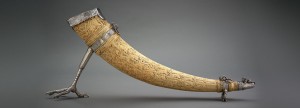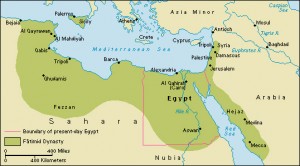World of the Fatimids
Tuesday, April 17th, 2018April 17, 2018
Today, World Book extends Arab American Heritage Month to Canada, where the Aga Khan Museum in Toronto is featuring an exhibition called The World of the Fatimids. The Fatimids, often written as Fātimids, were a dominant Arab culture that ruled much of northern Africa and parts of the Middle East from A.D. 909 to 1171. The World of the Fatimids exhibition, which began in March 2018 and runs through early July, features rare items of art and luxury, as well as a program of films and lectures that concentrates on the culture’s influence on Cairo, the erstwhile Fātimid capital and current capital of Egypt.

This carved ivory oliphant (hunter’s horn) is part of The World of the Fatimids exhibition at the Aga Khan Museum in Toronto, Ontario. Credit: © The Aga Khan Museum
The Fātimid dynasty was a line of Muslim rulers who claimed descent from Fātimah, a daughter of the Prophet Muhammad, and her husband, Alī ibn Abī Tālib, a cousin of the Prophet. The dynasty and its followers belonged to the Shī`ah branch of Islam and to a sect called the Seveners. In 909, they gained control over land that had been held by the larger group of rival Sunni Muslims and rose to power in north Africa. At various times, the Fātimid empire included Sicily, Syria, and parts of Arabia and Palestine.

Click to view larger image
From the 900′s to 1171, the Fātimids ruled an empire that covered North Africa and much of the Middle East. Credit: WORLD BOOK map
For many years, the Fātimids made their capitals in what are now the cities of Al Qayrawan and Al Mahdiyah, Tunisia. But after winning control of Egypt in 969, they founded a new capital, Al-Qahirah (Cairo). There, they built many beautiful buildings and established al-Azhar University. Today, this university is one of the oldest in the world and the most influential religious school in Islam. The Fātimids also established great libraries in Cairo and in Tripoli, Lebanon.
The Fātimid rulers were good leaders, but internal conflict eventually broke the dynasty apart. Members of the court struggled for power in the 1160′s, and Nūr al-Dīn, a Syrian leader, became involved. The last Cairo ruler asked Nūr al-Dīn for protection against an invasion in 1168. Nūr al-Dīn sent a strong force that included Saladin, a great warrior who overthrew the Fātimid dynasty in 1171. Today, Shī`ites (followers of Shī`ah Islam) who remain loyal to the Fātimid dynasty are known as Ismā`īlīs (Ismailis).
Aga Khan is the title of the Ismā`īlī imām (spiritual leader). Toronto’s Aga Khan Museum, a creation of the Aga Khan Development Network run by Aga Khan IV (1936-…), opened in 2014. The museum houses collections of Islamic art and heritage and shares formal gardens and a park with the Ismaili Centre Toronto.


